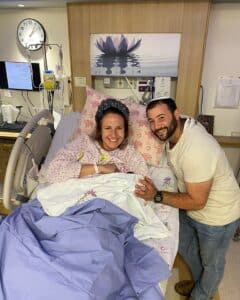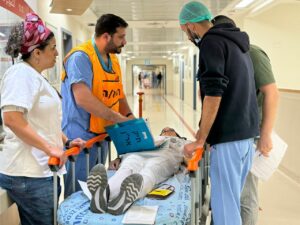Dr. Yaron Almagor, Director of Interventional Cardiology in the Jesselson Heart Center at Jerusalem’s Shaare Zedek Medical Center has performed literally thousands of procedures throughout his career. So when he describes one recent procedure as a “professional highlight” one can assume that it must have been something unique.
Indeed, Dr. Almagor had the chance to perform a form of valve implantation that has been performed only three times anywhere in the world – and only once before has been successful. So rare is the procedure that Dr. Almagor had to struggle to even give it a name, but he says that the term Percutaneous Mitral Valve in Valve Implantation best describes the medical feat.
Percutaneous refers to procedures performed without requiring surgery. Dr. Almagor acknowledges that wherever possible, non-surgical options are far preferred and even necessary in cases in which a patient would not be able to survive the rigors of open-chest surgery.
The procedure was performed as part of a live broadcast to the TCT Interventional Cardiology Conference in Miami, FL. The conference attracts over 10,000 medical professionals and is widely regarded as the most prominent annual event of its type. This was the seventh time that Dr. Almagor was invited to broadcast to the conference, a professional honor in its own right, but he admits that the tension of the procedure far exceeded any emotions around the broadcast. He says that this was a case where “we were literally putting all the cards on the table. A successful procedure would mean that the patient would live but we were very aware that anything could happen.”
The patient was in a “very serious state” whereby he had undergone several prior procedures and was extremely weak and underweight. Dr. Almagor surmised that the best chance for the patient, whose cardiac valves had experienced significant deterioration despite having been replaced, would be to perform this extremely complex and rare “valve in valve” approach. Essentially, a new valve would be threaded into place within the extremely tight confines of a pre-existing valve which had become damaged – hence “valve in valve”.
He put together a truly comprehensive “Heart Team” consisting of cardiologists, anesthesiologists, support staff and cardiac surgeons in case they needed to immediately perform surgery – which was viewed as an option only if all other approaches failed. “There was almost no precedent for what we were doing so we could only rely on our experience and instincts to determine how we would proceed, knowing that we really only had one chance to get this right.”
After a relatively brief procedure- and Dr. Almagor advises that length is by no means an indicator of complexity- the patient was transferred to the recovery unit for supervision and monitoring. Only days later he was discharged from the hospital and is making remarkable progress, now walking on his own.
“This was a moment when a doctor could really look at what was accomplished and say that he was a part of history, as this was without doubt the most professionally satisfying moment of my career and is a source of pride for our department, for Shaare Zedek and certainly for our country in its role as a medical pioneer,” Dr. Almagor says while pointing out that the artificial valve itself is also “Made in Israel.”
While hesitant to say exactly what this accomplishment means for the future of cardiac medicine, he firmly believes that it represents a breakthrough that will have an impact for years ahead.
Soon after the procedure, Dr. Amagor left for the United States where he presented to the TCT Conference in person. He said in the days following he received a torrent of emails and text messages of congratulations. “The experience really reminded us of the importance of what we’re doing and how fortunate we are to be able to use technology and experience to change lives in ways that were never before possible.”










